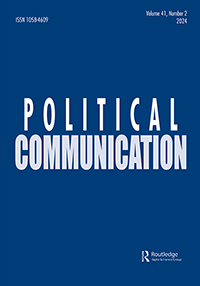求助PDF
{"title":"How Science Influencers Polarize Supportive and Skeptical Communities Around Politicized Science: A Cross-Platform and Over-Time Comparison","authors":"Sedona Chinn, Dan Hiaeshutter-Rice, Kaiping Chen","doi":"10.1080/10584609.2023.2201174","DOIUrl":null,"url":null,"abstract":"Contention over COVID-19 is only a recent example of increasing social division around science in the U.S. Many blame these divisions on actors who have strategically sowed doubt and distrust around expert supported positions and policies. However, this overlooks how scientists have fueled narratives of social and political conflict around science. This study explores how science influencers on social media have used group identity language in ways that may perpetuate narratives of intergroup conflict around science. Using computer-assisted content analytic methods, we examine how science influencers' use of group identity language has changed in response to recent events (Trump presidency, COVID-19 pandemic) and across different social media platforms (Twitter, Facebook, Instagram). While there are slight increases in group identity language between 2016 and 2021, different patterns across platforms suggest that science influencers use different platforms to perform multiple roles of engaging diverse audiences, building ingroup solidarity, and defending against outgroup criticism. © 2023 Taylor & Francis Group, LLC.","PeriodicalId":20264,"journal":{"name":"Political Communication","volume":" ","pages":""},"PeriodicalIF":5.1000,"publicationDate":"2023-04-19","publicationTypes":"Journal Article","fieldsOfStudy":null,"isOpenAccess":false,"openAccessPdf":"","citationCount":"1","resultStr":null,"platform":"Semanticscholar","paperid":null,"PeriodicalName":"Political Communication","FirstCategoryId":"90","ListUrlMain":"https://doi.org/10.1080/10584609.2023.2201174","RegionNum":1,"RegionCategory":"社会学","ArticlePicture":[],"TitleCN":null,"AbstractTextCN":null,"PMCID":null,"EPubDate":"","PubModel":"","JCR":"Q1","JCRName":"COMMUNICATION","Score":null,"Total":0}
引用次数: 1
引用
批量引用
科学影响者如何在政治化的科学周围分化支持和怀疑的社区:跨平台和长期比较
围绕新冠病毒的争论只是最近美国围绕科学的社会分裂加剧的一个例子,许多人将这些分歧归咎于那些在战略上对专家支持的立场和政策播下怀疑和不信任的行为者。然而,这忽略了科学家如何助长了围绕科学的社会和政治冲突的叙述。本研究探讨了社交媒体上的科学影响者如何以可能使围绕科学的群体间冲突叙事永久化的方式使用群体身份语言。使用计算机辅助内容分析方法,我们研究了科学影响者对群体身份语言的使用如何随着最近的事件(特朗普总统任期、COVID-19大流行)和不同的社交媒体平台(Twitter、Facebook、Instagram)而变化。虽然2016年至2021年期间群体认同语言略有增加,但不同平台的不同模式表明,科学影响者使用不同的平台来扮演吸引不同受众、建立群体内团结和抵御群体外批评的多重角色。©2023 Taylor & Francis Group, LLC
本文章由计算机程序翻译,如有差异,请以英文原文为准。


